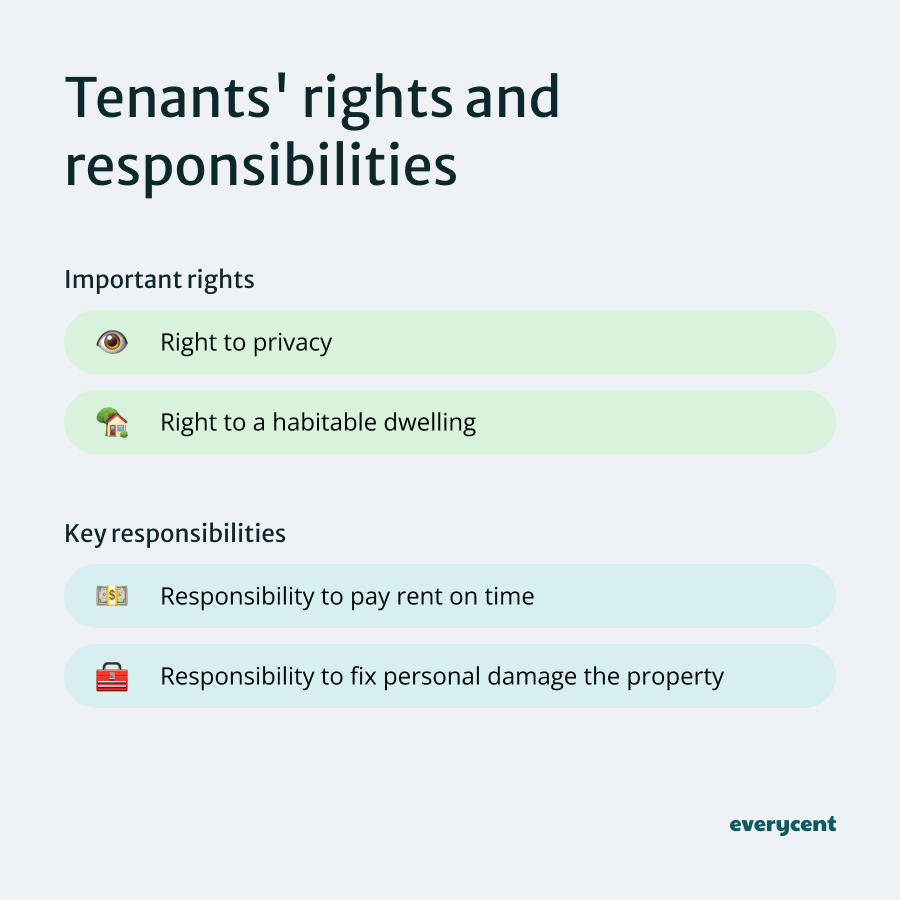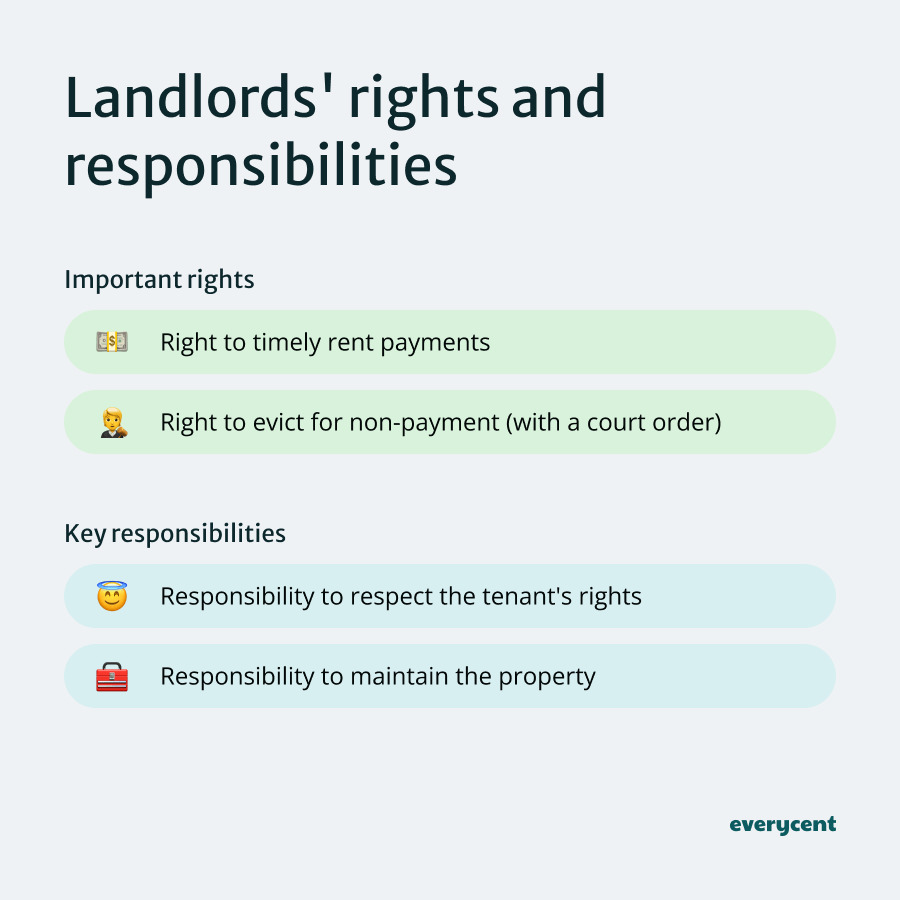People lose their cool when money things involve money.
Renters who can’t pay get desperate, and landlords who aren’t getting paid get frustrated.
Either way, it can get messy if you don’t know your rights.
Here’s what each side may and may not do in South Africa.
Landlords and Tenants Rights and Responsibilities
The landlord is responsible for lawfully attending to maintenance. Only if it isn’t the tenant’s fault. Additionally, they must provide undisturbed use and enjoyment of the property. There should be no unlawful interference. Tenants are responsible for timely rental payments and maintenance. Only to damage that they’re responsible for.
Two important pieces of legislation to take note of are:
- The Rental Housing Act 50 of 1999
- Prevention of Illegal Eviction from and Unlawful Occupation of Land Act 19 of 1998.
These docs are a go-to for a detailed outline of tenant rights and what a landlord can and cannot do.
To save you some time, we wrote down the important stuff.
Are you struggling to pay rent? Check to see if you qualify to reduce the cost of your debt and free up money for rent.
Tenants’ rights and responsibilities
Tenant’s rights and responsibilities include:
- Right to privacy: Landlords must respect the tenants’ privacy. They may only enter the rented premises with permission. Unless in an emergency.
- Right to a habitable dwelling: The property must be in a state fit for living upon occupancy.
- Responsibility to pay rent on time: This is very important. Paying on time helps maintain a good tenant-landlord relationship.
- Responsibility to maintain the property: The law expects normal wear and tear. But, tenants must fix any significant damage that’s their fault. And do so at their own expense.

Landlords’ rights and responsibilities
Landlords also have their set of rights and responsibilities, which include:
- Right to timely rent payments: Landlords can expect tenants to pay their rent. On time as agreed upon in the lease agreement.
- Right to evict for non-payment: Landlords can evict tenants who fail to pay rent. As long as the process follows proper legal procedure.
- Responsibility to maintain the property: Landlords need to keep the property habitable. Which involves attending to repairs that aren’t the tenant’s fault.
- Responsibility to respect the tenant’s rights: The tenant has a right to privacy and enjoyment of the property. Without undue interference by the landlord.

Great. Now we know the rules. Two things stand out. One, the responsibility to pay rent on time. And two, the right to evict for non-payment.
These deserve a closer look.
Illegal eviction and unlawful occupation
Eviction and unlawful occupation laws exist for a reason. The legislation protects both sides of the rental agreement.
First, we’ll look at things from a tenant’s perspective—what to do when paying rent is no longer an option. Then, from the landlord’s perspective— how to get rid of a tenant who isn’t paying rent.
For Tenants: What are your rights if you can’t pay rent in South Africa
Tenants who can’t pay rent still have rights. First, the landlord must give 14 days’ notice before the eviction process begins. Till the court issues an eviction order, the tenant retains all their rights. Including appropriate notice before the landlord enters the rental unit. The right to access the property, which means the landlord may not change the locks. And the right basic utilities. Things like water and electricity.
The landlord has to follow the proper legal procedure to evict someone.
If you’re a tenant in this situation, take notes. Here’s what a landlord cannot do in this situation.
What a landlord cannot do in South Africa
Tenants who can’t pay rent still have rights. A landlord may not evict a tenant without a court order. Even if they aren’t paying rent. Changing locks and cutting off utilities aren’t allowed either. The landlord has to follow the proper legal procedure to evict someone.
In South Africa, a landlord cannot:
- Evict a tenant without a court order.
- Cut off utilities.
- Lock out a tenant.
- Seize a tenant’s belongings.
- Harass or intimidate the tenant.
1. Evict a tenant without a court order: The landlord has to follow the legal eviction process. Landlords can’t evict someone without following the proper procedures outlined by the law.
2. Cut off utilities: Landlords are not allowed to shut off essential services. Cutting off water, electricity, or waste removal in an attempt to force a tenant out is illegal.
3. Lock out a tenant: Changing the locks or using other ways to keep the tenant out is illegal.
4. Seize a tenant’s belongings: A landlord cannot take any of a tenant’s personal property.
5. Harass or intimidate the tenant: The law doesn’t allow harassment or intimidation.
That covers what landlords cannot do in this situation. What is equally important is what tenants can do in this situation.
What are the options if you’re stuck in this predicament?
Things tenants can do if they can’t pay rent
Tenants who can’t afford to pay their rent have several options. Some relate to the home they’re renting and other options involve alternatives.
Here are options for tenants who can’t afford rent:
- Negotiate a payment plan that works for both parties.
- Find a cheaper rental unit.
- Apply for debt review.
- Seek legal advice.
- Approach the Rental Housing Tribunal.
- Apply for government support.
1. Negotiate a payment plan that works for both parties: Talk to the landlord. They may be willing to agree to a more affordable payment arrangement. This way, the tenant gets to stay, and the rent gets paid.
2. Find a cheaper rental unit: Moving somewhere more affordable may be the best option.
3. Apply for debt review: Debt review can free up cash by lowering monthly debt repayments. The process consolidates debts and makes them more affordable by negotiating lower instalments. It’s a good option for anyone in a difficult financial position.
4. Seek legal advice: Consult a legal professional to clarify your rights and options. This may include protection against eviction and advice on negotiating with the landlord.
5. Approach the Rental Housing Tribunal: If the landlord is in the wrong, then the Rental Housing Tribunal can help. They can provide mediation and arbitration to settle issues like unfair evictions or rent disputes.
6. Apply for government support: Check if you qualify for government housing assistance programs. These programs help support individuals facing financial hardship. For some, this may be an option during difficult times. Keep in mind that the process may take a long time. It may not provide instant relief.
📖 Related content:
- Advantages and disadvantages of debt counselling (debt review)
- Things you can do if you can’t afford your car payment
Now, what about the other side of the coin? The landlord’s perspective.
Are you struggling to pay your rent?
For Landlords: How to get rid of a tenant not paying rent
If a tenant isn’t paying their rent, landlords have the right to legally terminate their lease and ask them to leave. If they refuse, the landlord should give 14 days written notice and begin the eviction process. After the formal notice period, the landlord may apply to the court for an eviction order to legally evict the tenant for breach of contract.
Here are steps landlords can take to evict a tenant who isn’t paying rent:
- Communicate with the tenant: Try to understand they’re not paying and reach a mutual agreement. A payment plan or lower rent may make the rent affordable for the tenant.
- Send a formal notice: If initial communications fail, then it’s time to send a formal notice. The notice should specify the amount owed and the deadline for payment. Make sure it follows the terms of the lease agreement.
- Apply for eviction: If the tenant continues to default on their rent, the next step is to apply to the court for an eviction order. This process has to follow legal procedures. Refer to the Prevention of Illegal Eviction from and Unlawful Occupation of Land Act.
- Seek legal advice: A lawyer can help with the process. If possible, consult with a lawyer. Legal help ensures everything complies with South African law.
- Consider the Rental Housing Tribunal: If there’s a dispute, the Rental Housing Tribunal can help. The Rental Housing Tribunal offers mediation and arbitration for these kinds of disputes.
A misstep during the eviction process could complicate things. Landlords must follow the legal process to avoid any allegations of illegal eviction or mistreatment.
In summary
Both sides are protected by South African law.
Whether you’re a landlord or a tenant in a sticky situation—there’s a way forward.
Try to resolve the issue by first communicating with the other party. If that doesn’t work, then it may be time to consider the alternatives.
Want to learn more? Keep reading on Everycent.